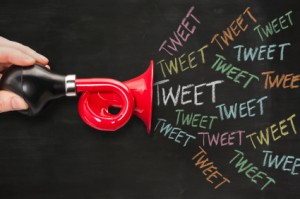 In November 2012, sports reporter Lance Witten with South Africa’s eNCA news station was suspended from work when he posted an offensive tweet after the death of a Linkin Park concertgoer.
In November 2012, sports reporter Lance Witten with South Africa’s eNCA news station was suspended from work when he posted an offensive tweet after the death of a Linkin Park concertgoer.
Witten is neither the first nor last journalist to face serious repercussions after letting fly a tweet or Facebook post that would have been better left unsaid. Take former Politico blogger and Senate reporter Dave Catanese, who was pulled from Politico’s coverage of former U.S. Rep. Todd Akin late last summer. This only came after Akin had made controversial comments regarding what he referred to as “legitimate rape” and Catanese took to Twitter and sided with Akin “for argument’s sake.”
Politico is no stranger to suspending reporters over posts on Twitter. Earlier last summer, White House correspondent Joe Williams was suspended for racially insensitive remarks about then-presidential candidate Mitt Romney during an interview on TV, in addition to inappropriate posts made regarding Romney on Twitter.
In April 2012, Chicago Sun-Times sports columnist and White Sox beat reporter Joe Cowley made sexist jokes on Twitter and was put on “final notice” according to Time Out Chicago. CNN’s Roland Martin posted homophobic tweets during the Super Bowl last year and was suspended, while Ohio Fox 19 anchor Tricia Macke was suspended briefly for homophobic comments directed at MSNBC host Rachel Maddow on Facebook.
Back in 2010, the Washington Post suspended sports columnist Mike Wise for purposely hitting send on a false tweet. Meanwhile, former CNN senior editor for Middle Eastern affairs Octavia Nasr, Arizona Daily Star reporter Brian Pedersen and Canadian sports reporter Damian Goddard from Rogers Sportsnet, were all fired for tweets deemed unforgiveable by their employers.
Twitter may have become a vital journalistic tool, but quite a few in the industry have paid the price for their folly. Based on this track record, it wouldn’t be implausible to assume there are plenty of journalists who approach Twitter and other forms of social media with a measure of anxiety or even fear. CNN president Jeff Zucker recently said in a public appearance that “Twitter is a frenemy,” while noting that although the network relies on social media, it is also scared by it, MediaShift reported.
Adam Brandolph, a reporter with the Pittsburgh Tribune-Review, admitted that when he first started using Twitter he was nervous. “I was most anxious about spelling words wrong, or that autocorrect would change a word or a proper name into something crazy or embarrassing, so even today I read the tweet two or three times before I hit ‘send,’” he said in an email interview.
The biggest danger, however, is getting something wrong, he noted. “Covering the courts and not being a lawyer, there are times when I need something explained. If I can’t get an answer and I’m on deadline, I usually stay clear of tweeting about it, or I couch the tweet to avoid what I don’t know. My basic rule is to stick to the facts I know.” Regardless of the risks, Brandolph believes that social media benefits far outweigh the risks.
Steve Buttry, director of community engagement and social media for Digital First Media, is a big proponent of social media and noted it’s not the medium itself that is the problem. “My feeling is that the times when people have been suspended and lost their jobs and those sorts of things, Twitter has merely been the vehicle for stupidity. People lose their jobs for saying stupid things, if they had said the same thing on a radio talk show or in a panel out in the community, the penalty would probably have been the same,” he said.
Although newsroom policies are good to have, Buttry takes more stock in open conversation as a way to help journalists understand where the line between appropriate and inappropriate is drawn. Most social media behavior, he noted, doesn’t fall into the range of being punished, but training and good newsroom conversation can help foster effective social media use.
Meanwhile, just because it’s not an accepted journalistic practice to espouse opinions and political views publicly, Buttry said media professionals can still have a personality. “My success as a journalist has always related to my ability to relate to people as a person,” he said. “Social media demands that. And you can do that without giving opinions if it’s not appropriate to state your opinions. You can do that without crossing lines, and with some sense of humor.”
–Katrina M. Mendolera![]()

